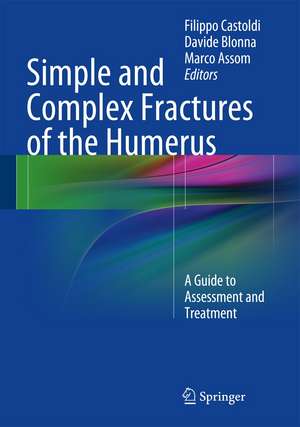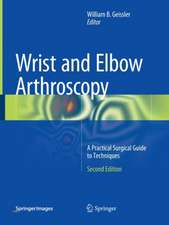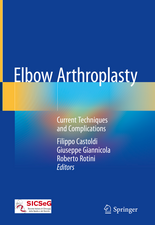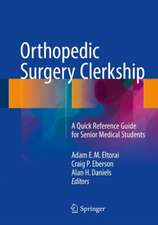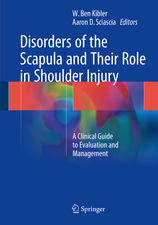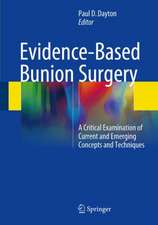Simple and Complex Fractures of the Humerus: A Guide to Assessment and Treatment
Editat de Filippo Castoldi, Davide Blonna, Marco Assomen Limba Engleză Hardback – 13 oct 2014
This volume clearly explains the concepts that are central to an understanding of humeral fractures from the proximal to the distal tip. Indications for different forms of treatment, including nonsurgical, are presented in detail, and all of the commonly used fixation techniques are described with the help of high-quality illustrations. Further important aspects such as complications, rehabilitation, and treatment of sequelae are also fully considered. This book will be an invaluable and comprehensive aid for all surgeons who treat humeral fractures.
| Toate formatele și edițiile | Preț | Express |
|---|---|---|
| Paperback (1) | 662.34 lei 38-44 zile | |
| Springer – 4 mai 2017 | 662.34 lei 38-44 zile | |
| Hardback (1) | 687.75 lei 38-44 zile | |
| Springer – 13 oct 2014 | 687.75 lei 38-44 zile |
Preț: 687.75 lei
Preț vechi: 723.94 lei
-5% Nou
Puncte Express: 1032
Preț estimativ în valută:
131.59€ • 137.41$ • 108.67£
131.59€ • 137.41$ • 108.67£
Carte tipărită la comandă
Livrare economică 12-18 aprilie
Preluare comenzi: 021 569.72.76
Specificații
ISBN-13: 9788847053069
ISBN-10: 8847053064
Pagini: 300
Ilustrații: XIX, 337 p. 200 illus., 135 illus. in color.
Dimensiuni: 178 x 254 x 25 mm
Greutate: 0.94 kg
Ediția:2015
Editura: Springer
Colecția Springer
Locul publicării:Milano, Italy
ISBN-10: 8847053064
Pagini: 300
Ilustrații: XIX, 337 p. 200 illus., 135 illus. in color.
Dimensiuni: 178 x 254 x 25 mm
Greutate: 0.94 kg
Ediția:2015
Editura: Springer
Colecția Springer
Locul publicării:Milano, Italy
Public țintă
Professional/practitionerCuprins
PART 1 Proximal humerus: 1 Main anatomy.- 2 Understanding the Fracture.- 3 Operating theatre setup.- 4 Closed reduction principles.- 5 Surgical Approaches.- 6 Percutaneous fixation: when and how.- 7 ORIF in three-/four-part fractures.- 8 Intramedullary nail rationale and surgical technique.- 9 Anatomical shoulder arthroplasty.- 10 Reverse total shoulder arthroplasty.- 11 Surgical neck fracture.- 12 The tuberosities.- 13 Malunions of the tuberosity.- 14 Nerve injuries.- 15 Fracture dislocations.- 16 Treatment of the sequelae.- 17 Conservative treatment.- PART 2 The diaphysis: 18 Surgical anatomy.- 19 Radial palsy and humerus fractures.- 20 Internal Fixation: plate or IM Nail.- 21 External fixation.- 22 Periprosthetic fracture.- PART 3 Distal Humerus: 23 Surgical anatomy.- 24 Surgical approaches and fracture pattern.- 25 Internal fixation principles.- 26 Prosthesis.- 27 External fixation when and how.- 28 Malunion and non union.- 29 Terrible triad.
Recenzii
From the book reviews:
“This book represents an attractive concept in the age of information technology that allows easy Internet access to almost all data. … This book is written for practitioners and residents who want detailed information on humeral fractures in general, or on a specific fracture. … it is a potentially useful addition to an academic medical library that wants to be complete, and where the medical librarian identifies that medical personnel are using books as reference sources.” (Samuel J. Chmell, Doody’s Book Reviews, February, 2015)
“This book represents an attractive concept in the age of information technology that allows easy Internet access to almost all data. … This book is written for practitioners and residents who want detailed information on humeral fractures in general, or on a specific fracture. … it is a potentially useful addition to an academic medical library that wants to be complete, and where the medical librarian identifies that medical personnel are using books as reference sources.” (Samuel J. Chmell, Doody’s Book Reviews, February, 2015)
Textul de pe ultima copertă
The treatment of humeral fractures is a complex issue and the source of considerable controversy. In the case of fractures of the proximal humerus, early range of motion is the main aim of treatment. If a fracture modifies the anatomy or function of the glenohumeral and scapulothoracic joints, the surgeon must adhere meticulously to treatment principles in order to ensure a satisfactory outcome. Humeral shaft fractures are frequent, accounting for 1% to 3% of all fractures in adults; while excellent functional results have been reported with nonoperative management, open reduction and internal fixation is preferred in specific clinical settings. In contrast, intra-articular fractures of the distal humerus are frequently complex and full functional recovery is difficult to achieve.
This volume clearly explains the concepts that are central to an understanding of humeral fractures from the proximal to the distal tip. Indications for different forms of treatment, including nonsurgical, are presented in detail, and all of the commonly used fixation techniques are described with the help of high-quality illustrations. Further important aspects such as complications, rehabilitation, and treatment of sequelae are also fully considered. This book will be an invaluable and comprehensive aid for all surgeons who treat humeral fractures.
This volume clearly explains the concepts that are central to an understanding of humeral fractures from the proximal to the distal tip. Indications for different forms of treatment, including nonsurgical, are presented in detail, and all of the commonly used fixation techniques are described with the help of high-quality illustrations. Further important aspects such as complications, rehabilitation, and treatment of sequelae are also fully considered. This book will be an invaluable and comprehensive aid for all surgeons who treat humeral fractures.
Caracteristici
Explains key concepts relating to anatomy and humeral fractures Presents treatment indications in detail Describes all commonly used fixation techniques Discusses complications and their treatment Includes numerous high-quality illustrations
